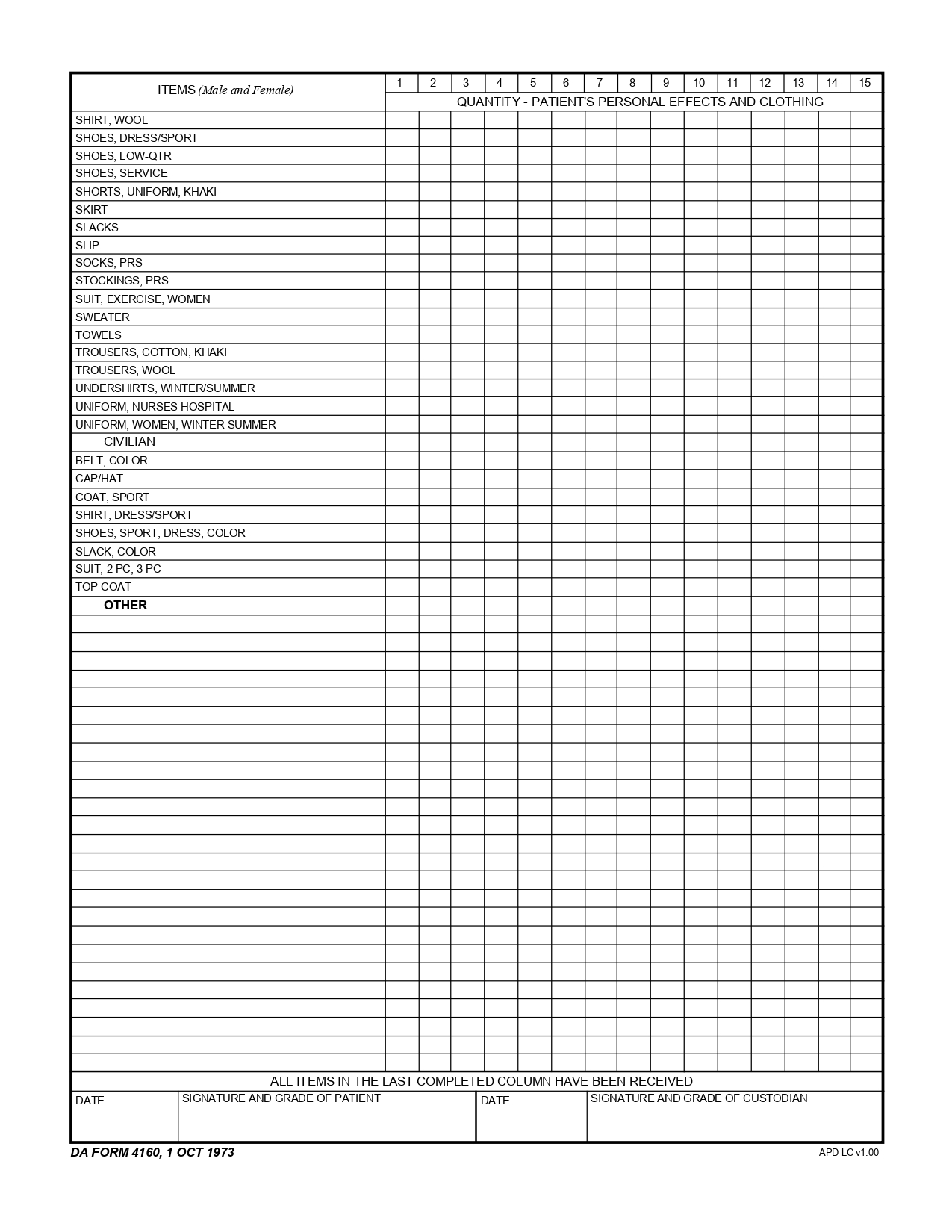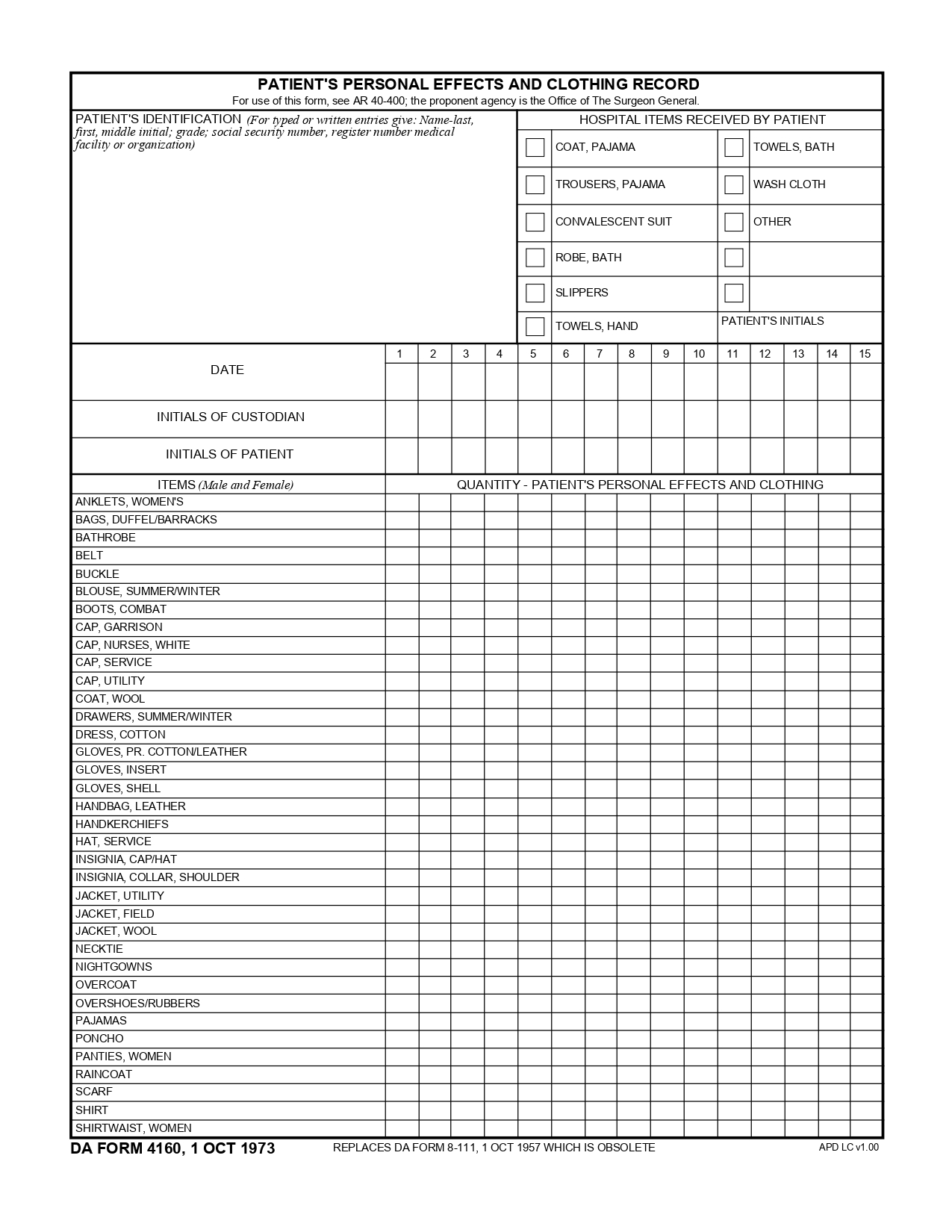DAFORMFILLABLE.COM | DA FORM 4160 Fillable – Army Pubs 4160 PDF – DA FORM 4160, also known as the Patient’s Personal Effects and Clothing Record, is an essential document used in medical settings to keep track of patients’ personal belongings. This form, established on October 1, 1973, plays a crucial role in ensuring the security and proper management of patients’ items during their stay in medical facilities. Below, we delve into the details of this form, its significance, and how it is utilized.
DA FORM 4160 – Patient`S Personal Effects And Clothing Record
| Form Number | DA Form 4160 |
| Form Title | Patient`S Personal Effects And Clothing Record |
| Form Date | 10/01/1973 |
| Form Proponent | TSG |
Overview of DA FORM 4160
Purpose and Importance
The DA FORM 4160 is designed to record and safeguard the personal effects and clothing of patients admitted to medical facilities. This meticulous documentation helps prevent loss, theft, or misplacement of items, thereby protecting both the patient’s property and the facility’s reputation.
Key Features of DA FORM 4160
- Pub/Form Number: DA FORM 4160
- Pub/Form Date: 10/01/1973
- Pub/Form Title: Patient’s Personal Effects and Clothing Record
- Pub/Form Proponent: TSG (The Surgeon General)
- Pub/Form Status: Active
- Prescribing Directive: AR 40-400
- Footnotes: Requires Privacy Act Statement (AR 340-21), only produced in electronic media
- Security Classification: Unclassified
- Distribution Restriction Code: A (Approved for public release; distribution is unlimited)
- Pub/Form IDN: 990001
- Pub/Form PIN: 003053
Detailed Breakdown of DA FORM 4160
Components of the Form
Section 1: Patient Information
In this section, the patient’s personal details are recorded, including their name, identification number, and date of admission. This information is critical for accurately associating the recorded items with the correct patient.
Section 2: Inventory of Personal Effects
This section lists the patient’s personal belongings. Each item is carefully documented, including its condition at the time of admission. Common items listed include clothing, jewelry, and other personal effects.
Section 3: Clothing Record
Here, the patient’s clothing is itemized, detailing each piece of clothing brought by the patient. This ensures that all clothing items are returned to the patient upon discharge.
Privacy and Security Measures
Given the sensitive nature of the information, the form requires a Privacy Act Statement in accordance with AR 340-21. This ensures that the patient’s privacy is protected and that the information is handled with the utmost care.
Utilizing DA FORM 4160
Who Uses the Form?
Healthcare providers and administrative staff within medical facilities are primarily responsible for completing and maintaining the DA FORM 4160. This includes hospitals, clinics, and other healthcare institutions.
Steps for Proper Use
- Initial Recording: Upon admission, a staff member records all personal effects and clothing brought by the patient.
- Verification: Both the patient (if able) and the staff member verify and sign the form to confirm the accuracy of the recorded items.
- Updates: Any additional items brought in or taken out during the patient’s stay are noted on the form.
- Final Check: Upon discharge, the form is reviewed, and all items are returned to the patient, who then verifies and signs off on the receipt of their belongings.
Importance of Proper Documentation
Benefits to Patients and Facilities
- Prevents Loss and Theft: By thoroughly documenting all items, the risk of loss or theft is minimized.
- Ensures Accountability: Both patients and staff are held accountable for the personal effects, fostering a trustful environment.
- Legal Protection: Proper documentation can serve as legal evidence in case of disputes regarding the patient’s belongings.
Conclusion
DA FORM 4160 is a vital tool in managing and protecting the personal effects and clothing of patients in medical facilities. Its careful use ensures that patients’ belongings are accurately recorded, safeguarded, and returned, maintaining trust and accountability within healthcare environments. By adhering to the guidelines and utilizing the form correctly, healthcare providers can enhance the overall patient experience and operational efficiency of their facilities.
DA FORM 4160 Fillable – Army Pubs 4160 PDF DOWNLOAD

